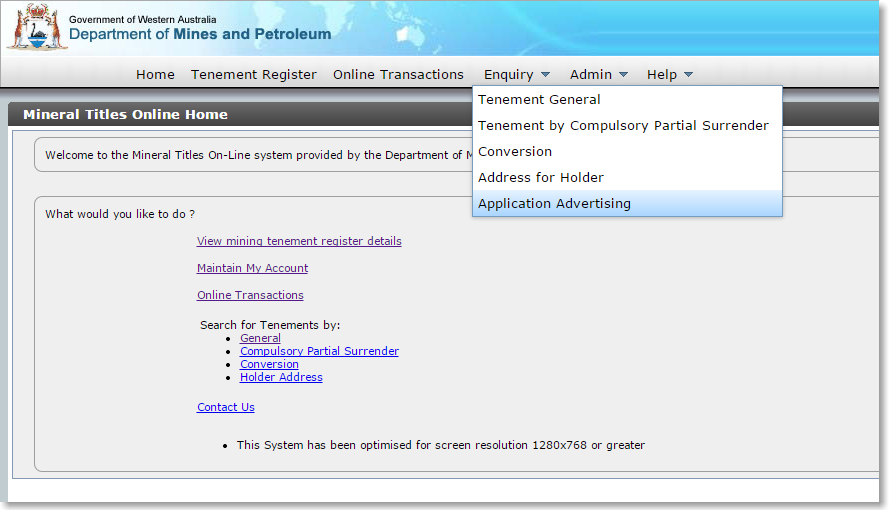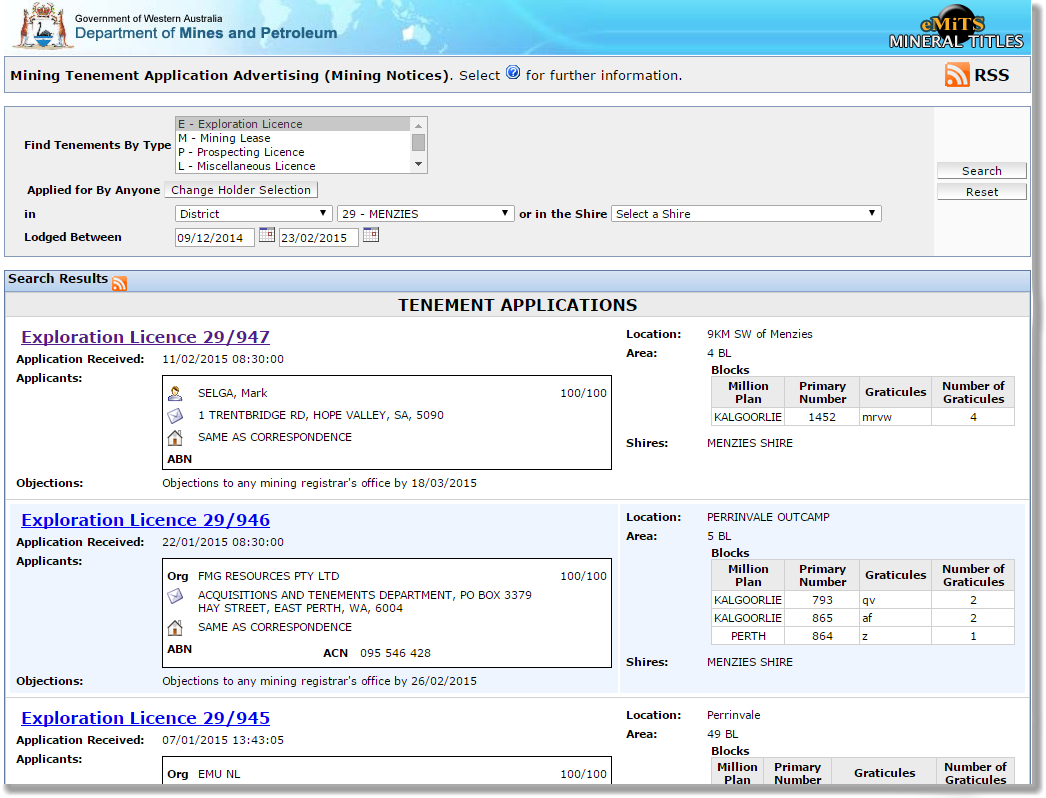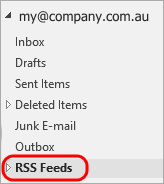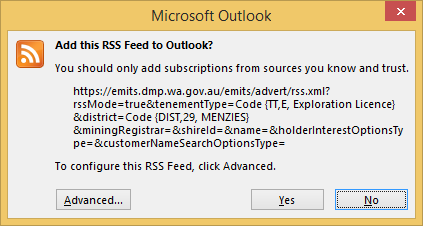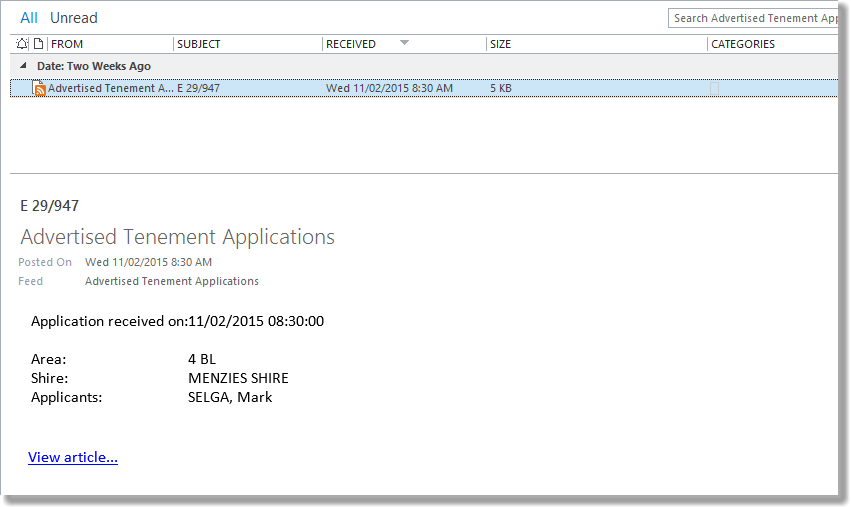Over the past few months there has been much talk about “Data Mining” and what effect it has on the Mining Industry of WA, with leading Kalgoorlie prospectors highlighting that a number of companies using “Data Mining” software on Mineral Titles Online (MTO) have an unfair advantage acquiring ground.
In response, the Department of Mines and Petroleum (DMP) has instigated a crackdown on companies using screen scraping software on MTO, while committing to create systems to provide equitable access to tenement data. This press release from Feb 16 2015 summarises the DMP’s position:
New user-friendly online tenement system
Monday, 16 February 2015
The Department of Mines and Petroleum (DMP) has moved to address industry concerns over ‘data mining’ of State Government computer systems.
A number of prospectors have expressed concern over the prevalence of large companies using special software to ‘crunch’ DMP online systems, in a bid to gain an advantage in securing surrendered tenements.
DMP’s Executive Director of Mineral Titles Dr Ivor Roberts said ‘data mining’ had become so intense it was disrupting the department’s online systems.
“To ensure equity, over the next few months the department will establish an online system where availability of tenements will be provided free of charge, following the registration of surrender,” Dr Roberts said.
The information will be visible to everyone at the same time, via the department’s website and distributed as a RSS feed, similar to the public lodgement notification of new tenement applications.
Additionally, detailed and cost-free tenement information from the department’s systems will be available for download the following day, alleviating the need for large companies to trawl through the department’s online systems for compliance purposes.
“This will help companies audit and manage their tenements for compliance as well as determine when ground is available, without the need for ‘data mining’,” Mines and Petroleum Minister Bill Marmion said.
“The data will not, however, include any pre-registration information that may indicate the surrender of a tenement.”
The online modifications follow extensive consultation with industry.
‘Data mining’ of DMP’s Mineral Titles online systems is a breach of their terms and conditions of use.
The following email from Phil Boyland, Manager, Legislation and Compliance, Mineral Titles on Feb 11 2015 also indicated the timeline for implementing the changes (our highlighting):
As a consequence of your comments, and those of others in the mining industry, the following actions are proposed by
the Mineral Titles Division.
- Tenement information will be available that is up to 24 hours old free of charge. This will assist companies to audit and manage their tenements for compliance purposes.
-
Information about the availability of ground will be provided for free following the registration of surrender by releasing this information on our website and as an RSS feed in a manner similar to the public lodgement notification of new tenement applications. This action will ensure that information on ground available to
Computer programming and modifications to our existing system is necessary to implement these actions. It is intended that action 1 will be completed before the end of March and Action 2 before the end of April.In the coming week, the benefits of implementing the actions being considered will be explained in full to all members of MILC, the major tenement consultants, and leading Kalgoorlie prospectors, and will be outlined in the next Mineral Titles Newsletter.
Telephone conversations with the Department on Wed, 11 th March 2015, have confirmed that the Department is on track to deliver Action 1 by the end of March. This will be in the form of an option on the Tenement Data XML Extract to supply historical data for free. This data will be emailed overnight instead of
immediately.
Action 2 is being worked on and at this stage looks like being ready by the end of April. This is likely to take the form of an RSS Feed being released to the public after 4:30pm each day containing all details of tenement surrender dealings. Until this release these dealings will not be visible on MTO or available for
download via the paid Tenement Data Extract.
Releasing information every afternoon in this way would create a de facto moratorium period, where every explorer in WA has at least 16 hours to lodge an application and thus enter a ballot for the ground. Releasing information incrementally over the day creates an alternative scenario where whoever can lodge
an application soonest (possibly even by having them pre-prepared on MTO and just entering credit card details) becomes the winner. However once the RSS feed is in place, it is a relatively simple matter to switch from one scenario to the other.
In the meantime, interested parties are advised by the DMP to subscribe to the existing Application Advertising RSS Feed to become familiar with how RSS Feeds work. Below is information about this and how to subscribe.
LandTrack Systems will be continuing to work with the DMP and our clients to ensure we maintain timely access to tenement data for compliance and monitoring purposes. If you would like to be kept informed of progress, contact us and we will add you to our mailing list for developments in this area.
What is an RSS feed?
‘Really Simple Syndication’ (RSS) is a format for delivering regularly changing web content. It allows you to easily stay informed by retrieving the latest content from sites of interest. You set up subscriptions using a special hyperlink, and then the RSS software will monitor that location for changes and notify you when something new has been released.
RSS feeds are checked regularly by your RSS software, ranging from daily to every few minutes. The more often your software refreshes the feed, the sooner you will be informed after a new item has been added to the feed. The major benefit of this approach is that you no longer need to keep manually checking MTO for dead tenements – software on your computer or mobile device will alert you automatically.
RSS servers can be configured to cut off subscribers who exceed the recommended refresh interval, so while there is an obvious competitive advantage to refreshing as frequently as possible, this may result in you being cut off. Enabling this feature may be a policy the DMP decides on.
Setting up a Tenement Applications RSS Feed in Microsoft Outlook
We’ll show you how to setup the RSS feed with Microsoft Outlook to look for tenement applications within a certain district.
- Log into Mineral Titles Online
-
Go to Enquiry -> Application Advertising
- The Mining Tenement Application Advertising (Mining Notices) window will be open
- You can setup your filter in the top section – Tenement Type, District etc
- When you’ve done setting the filter press Search to generate the updated feed
-
Right click the “Search Results” RSS icon, and select Copy Link Address. This will save the RSS address to the clipboard for use in Outlook
- Open Microsoft Outlook
-
Right click on RSS Feeds under your email account in the folder pane and select Add a New RSS Feed… You should see a small window asking you to enter the location of the RSS Feed
- Paste the previously copied link into the box provided and click Add
-
You’ll get another confirmation message – Click Yes to complete the process, otherwise clicking Advanced… will take you to RSS Feed Options where you can change the delivery location for the feed, automatically download attachments, or whether or not to use the provider’s update limit. Once these steps are complete you should have an active RSS feed setup in Outlook.
The RSS Feed will look similar to an Outlook mailbox, where selecting an item will show you a preview in the reading pane. The View Article link will take you to the application on Mineral Titles Online. The update limit set by the DMP’s RSS feed is 15 minutes. This means that the feed can be updated at a
minimum of 15 minutes – this interval is setup by default.
RSS on mobile devices
There are a number of free or low cost RSS apps available for Android or IOS.
Android – Feedly, Press, Flyne
IOS – Feedly, Newsify, Feeddler
If your Outlook account is also synced to your mobile device, you can view the RSS Feed through your device’s mail app.
With this setup, you will be able to see how easy it will be to track ground becoming available, creating a ‘more level playing field’ in land acquisition.
